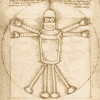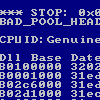Sorted by "More commented"
visits
757
votes
18
Posted on: Nov, 9th 2010

We absorb massive doses of WiFi radiation all the days, is important that we ask us if the WiFi signals are or are not harmful to the health. In this post I'm going to explain some known facts and in the next one I will deepen about the scientific studies that talk about this topic. Surprise yourself with the rest of "Are WiFi Networks healthy? (I)"
visits
9055
votes
60
Posted on: Sep, 17th 2010

Formerly, when still the CRT (Cathodic Ray Tube) monitors were in use, emerge the myth of cactus that absorb the monitor radiations. This swindle probably was thought by some illuminated herbalist that saw the bulky filters antiradiaton that was putting in front of the screen. Surely though that he can win a lot of money selling cactus as substitute of this filters, because a cactus is a lot of more nice and friendly than an authentic filter antiradiation. Follow reading if you want to know why this belief is absurd. Surprise yourself with the rest of "The myth of the antiradiation cactus"
visits
4354
votes
48
Posted on: Jun, 27th 2011

Today I'm going to dedicate the post to explain some basic concepts about the files that the 99% of the people that use a computer don't understand it very well.
Some users know that the last letters that there are at the end of a file (the extension), identifies the type of file, so, for instance, an archive ended in .JPG is a type of file of image and another ended in .GIF is a different image format with other characteristics. This, is true for most cases, but causes confusion in the cases where the extension isn't of a concrete format, unless of a format container. Follow reading "Differences between extension and format in a file"
visits
10378
votes
4
Posted on: Jul, 20th 2010

Not a lot of time ago has been resumed one of my favourite series, Futurama, realized by Matt Groenning, the creator of the Simpson.
Between the scriptwriters of Futurama are involved several scientist that provides continuously references to the science. In this post I'm going to explain the cryptography used in the series for code some alien inscriptions. Finish reading "The Futurama code: First part"
visits
1396
votes
-18
Posted on: Feb, 25th 2013

The RGB color model is a great invention which allows that with the mixture of different intensities of red, green and blue, any monitor or television can reproduce the colors of the reality. But ... how is it achieve? and why the colors of the model aren't others? The answer is in our eyes.
The retina is the part of the eye where we capture the light, and this is made thanks to a kind of modified neurons for detect photons: the rods and the cones.
Learn more about "Why RGB?"visits
482
votes
-22
Posted on: May, 14th 2012

In an epoch in that only were a few mechanic calculators, Alan Turing, was able to define the working, the limits and the possibilities of the computers. He not only was ahead to his epoch, but also to the actual and if had not been suicided, probably he would invented something that would convert the computers in something obsolete. Read the rest of "Alan Turing: Biography"
visits
2415
votes
-82
Posted on: May, 6th 2012

A lot of people have seen this object without knowing it in animation films, videogames and screensavers, because also is an object that appears as basic in almost all the tools of 3D modeling (3D Studio Max, POV-Ray, AutoCAD, etc). Even there are functions to create this teapot in a lot of libraries of graphic programming, this is due to that, like the Lena's photo, this 3D model of a teapot, has been converted in the standard of reference in a lot of scientific papers of 3D graphics. Follow discovering "The Newell's teapot"
visits
24843
votes
-3
Posted on: Apr, 29th 2012

A photo has been converted in the standard of reference in the computer sciences. Over this have been applied, from the years 70, a big quantity of algorithms of graphic computing, compression and artificial intelligence. Enter into "The photo of Lena Söderberg"
visits
205
votes
-48
Posted on: Oct, 30th 2011

Surely that a lot of times you have found webs impossible of be read, due to the color combinations used.
For that reason I've programmed a script that can transform any webpage making it more accessible. If you drag and drop this link to the bookmarks or favorite bar of your browser, and you click on it, when you find a web with colors that doesn't allow read it clearly, the web will change their color with the colors of Computable minds and the accesibility will be better in the majority of cases. If you want that the script will be executed always in all the webs, you can install it, having activated the Firefox extension Grease monkey, or using Chrome, and clicking in this link. Don't left of read the rest of "How to see better the web pages and improve its accessibility?"
visits
272
votes
-11
Posted on: Aug, 27th 2011

There are computer systems that can be danger to human, and when one of these system has not passed the necessary tests, then can occur mortal errors. Here I'm going to comment some of the software errors that more deaths has been left. Learn more about "Mortal computer errors"
visits
218
votes
-1060
Posted on: Jul, 13th 2011

From the begin of the boom of the Web in 1992, its evolution has been each time faster. Here will see how has been that evolution and what is coming. Read the rest of "History and future of the Web"
